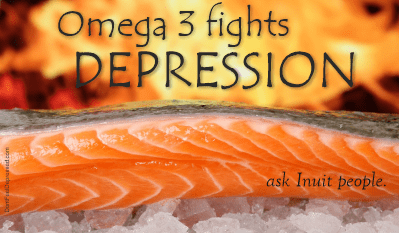Is Omega-3 good for depression? Studies say it is.
Omega-3 fatty acids are found primarily in fish oil and certain marine algae. Scientists said that people who eat large amounts of fish don’t get depressed.
Can you imagine Inuit people, who eat lots of fish, getting depressed? And, by all means, they have all the reason in the world to be sad and depressed. What is the lifestyle there? The cold temperatures? The hard work? Only by thinking of these and I want to kill myself, hoping that I may get lucky in the next life and be reborn on a Greek island…. At least it’s warmer.
Anyway, scientists say these people are not depressed. And that is due to the fish. We have to believe them, because there is no other explanation.
Omega-3 fatty acids include 2 acids: eicosapentaenoic acid (EPA) and docosahexaenoic acid (DHA). Let’s take supplements with these.
1 gram Omega-3 per day corresponds to eating three salmon meals per week.
Have studies proven Omega-3 is good for depression?
There have been over 30 clinical trials that used Omega-3s as add-on therapy for people who are taking prescription antidepressants with limited or no benefit. Fewer studies have examined Omega-3 therapy alone. Clinical trials typically use EPA alone or a combination of EPA plus DHA, at doses ranging from 0.5 to 1 gram per day to 6 to 10 grams per day.
! The most effective preparations appear to have at least 60% EPA relative to DHA.
However, DHA is more efficient against suicide. There have been recent work at Massachusetts General Hospital and Emory University showing that EPA treatment is good for depressed individuals with suicidal tendencies, who are overweight and have elevated inflammatory activity.
How much Omega-3 do I have to take for depression?
Probably the best dose is 2g/day of EPA+DHA combination, with a 60% EPA.
Most studies use doses between 1 and 2 g/day, and the wide recommendations range from less than 1 g/day to 10 g/day.
* Be cautious with bipolar depression. Omega-3s may bring on mania, just like the other antidepressants do. Use it in combination with a prescription mood stabilizer.
Are there any side effects of Omega-3?
Generally, they are safe and well tolerated. There may be a “fishy taste” in the mouth.
People taking blood thinners or who are about to undergo surgery should be cautious and talk to his/her physician.
Too much Omega-6 and too little Omega-3
Scientists call Omega-6 the Arachidonic acid (AA). A polyunsaturated omega-6 fatty acid 20:4.
In an early study by P B Adams et al., it was shown that severely depressed patients, had high ratios of AA/EPA. They could not tell if this ratio was the result of depression or whether it predated it. However it may be, this imbalance should be addressed, aiming to reduce the AA/EPA (Omega-6/ Omega-3) ratio in tissues and the severity of depression.
A 2003 study by Henning Tiemeier et al. also showed that fatty acid composition is related to depression, in community-dwelling persons. And, “Because this relation was not secondary to inflammation, atherosclerosis, or possible confounders, it suggests a direct effect of fatty acid composition on mood.”
Another study by M Maes et al. examined the fatty acid composition of serum cholesteryl esters and phospholipids in 36 major depressed, 14 minor depressed and 24 normal subjects. The results showed that major depressed subjects had significantly higher C20:4 omega 6/C20:5 omega-3 ratio in both serum cholesteryl esters and phospholipids and a significantly increased omega-6/omega-3 ratio in cholesteryl ester fraction than healthy volunteers and minor depressed subjects.
Another study of M Maes showed that, in major depression, there is a deficiency of omega3 PUFAs and a compensatory increase in MUFAs and C22:5omega6 in phospholipids. Which in English means too much Omega-6 and too little Omega-3. 🙂
And the studies seem to never end, all saying the same thing: too much Omega-6 and too little Omega-3.
Natural sources of Omega-3
- salmon or mackerel, tuna, herring and sardines;
- flaxseed oil, chia seeds, and walnuts;
Omega-3 dietary supplements
fish oil, krill oil, cod liver oil, and algal oil (a vegetarian source that comes from algae)
 picture source pixabay
picture source pixabay
References and further reading:
health.harvard.edu/blog/omega-3-fatty-acids-for-mood-disorders-2018080314414


